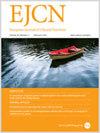口服铁剂八周可改善缺铁性贫血年轻女性的姿势控制能力。
IF 3.6
3区 医学
Q2 NUTRITION & DIETETICS
引用次数: 0
摘要
研究目的本研究旨在探讨为期 8 周的口服补充剂对缺铁性贫血(IDA)年轻女性姿势控制能力的影响:本研究涉及 15 名患有 IDA 的女性,她们每天服用 160 毫克硫酸亚铁干胶囊(80 毫克,每天两次),分两次服用,连续服用 8 周。记录压力中心(CoPv)摆动的平均速度,以评估补充铁剂前后的姿势控制能力。此外,还进行了简单反应时间(SRT)和重量辨别测试,以分别评估注意力能力和本体感觉敏锐度:结果:本研究显示,补充营养前和补充营养后,姿势控制能力明显提高(P本研究表明,口服铁补充剂 8 周后,患有 IDA 的年轻女性的姿势控制能力有了明显改善。这些改善可能与铁的生物利用率提高有关,铁的生物利用率提高可能会影响神经过程,从而导致注意力和本体感觉敏锐度的改善。本文章由计算机程序翻译,如有差异,请以英文原文为准。

Eight weeks of oral iron supplementation improves postural control in young women with iron deficiency anemia
This study aimed to explore the effect of 8-week oral supplementation on postural control in young women with iron deficiency anemia (IDA). This study involved 15 women with IDA who received 160 mg of elemental iron daily in the form of dried ferrous sulfate capsules (80 mg twice daily) taken in two divided doses for 8 weeks. The mean velocity of oscillations of the center of pressure (CoPv) was recorded to evaluate postural control pre- and post-supplementation. In addition, simple reaction time (SRT) and weight discrimination tests were performed to assess attentional capacity and proprioceptive acuity, respectively. This study revealed significant increases (P < 0.001, mean difference = 1.83, 95% CI: −17.25; −9.42) in proprioceptive acuity values, as well as decreases in CoPv [firm (EO (P < 0.01, mean difference = 0.52, 95% CI: 0.69; 2.92), EC (P < 0.05, mean difference = 0.75, 95% CI: 0.24; 3.45)) and foam (EO (P < 0.001, mean difference = 0.64, 95% CI: 1.71; 4.44) ; EC (P < 0.001, mean difference = 1.04, 95% CI: 3.51; 7.97))] and SRT (P < 0.001, mean difference = 59.31, 95% CI: 103.02; 168.71) values post-supplementation compared to pre-supplementation. This study showed significant improvements in postural control in young women with IDA after 8 weeks of oral iron supplementation. These improvements were probably related to the enhanced bioavailability of iron, which may have influenced neural processes inducing improvements in attention capacity and proprioceptive acuity.
求助全文
通过发布文献求助,成功后即可免费获取论文全文。
去求助
来源期刊
CiteScore
10.60
自引率
2.10%
发文量
189
审稿时长
3-6 weeks
期刊介绍:
The European Journal of Clinical Nutrition (EJCN) is an international, peer-reviewed journal covering all aspects of human and clinical nutrition. The journal welcomes original research, reviews, case reports and brief communications based on clinical, metabolic and epidemiological studies that describe methodologies, mechanisms, associations and benefits of nutritional interventions for clinical disease and health promotion.
Topics of interest include but are not limited to:
Nutrition and Health (including climate and ecological aspects)
Metabolism & Metabolomics
Genomics and personalized strategies in nutrition
Nutrition during the early life cycle
Health issues and nutrition in the elderly
Phenotyping in clinical nutrition
Nutrition in acute and chronic diseases
The double burden of ''malnutrition'': Under-nutrition and Obesity
Prevention of Non Communicable Diseases (NCD)

 求助内容:
求助内容: 应助结果提醒方式:
应助结果提醒方式:


